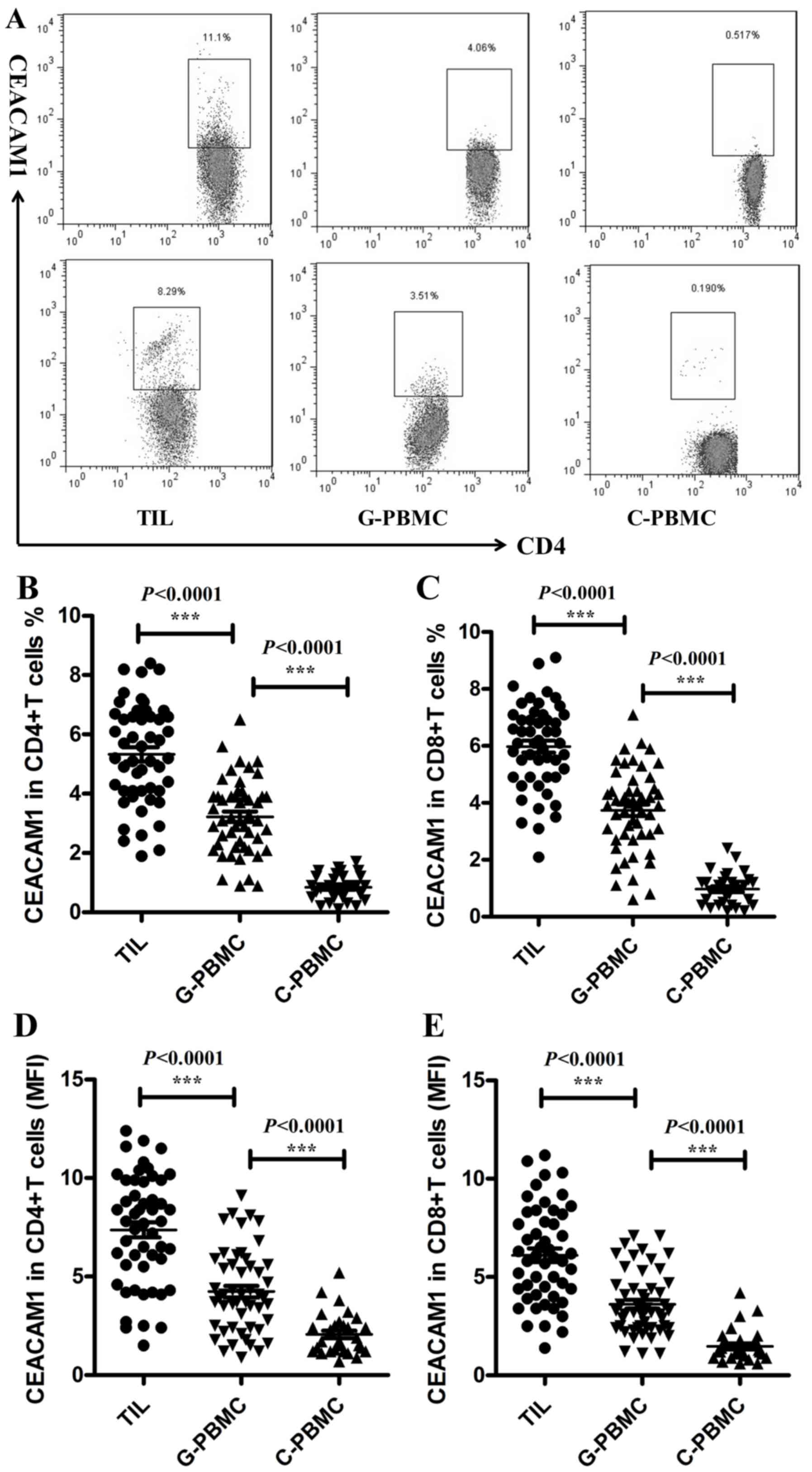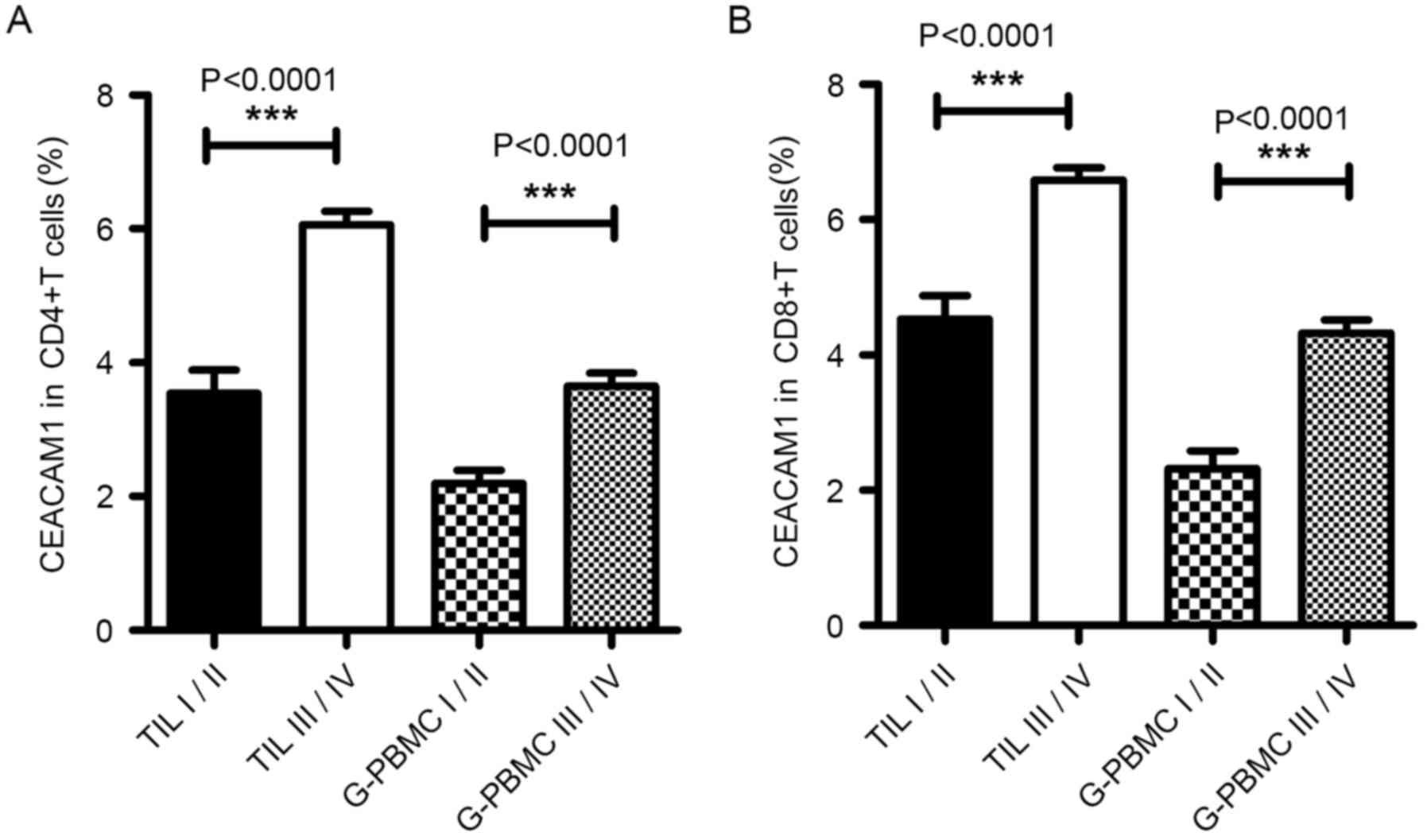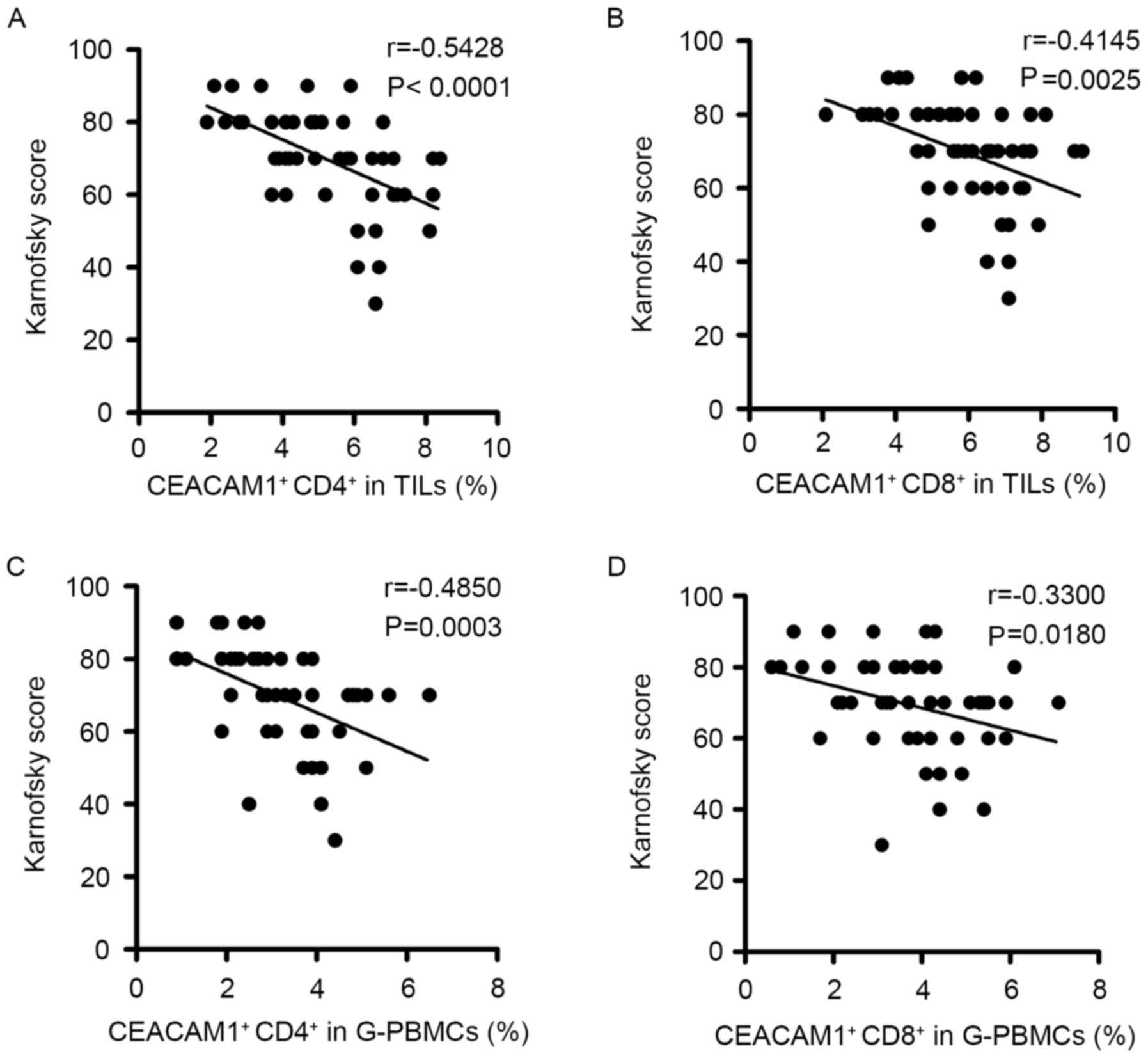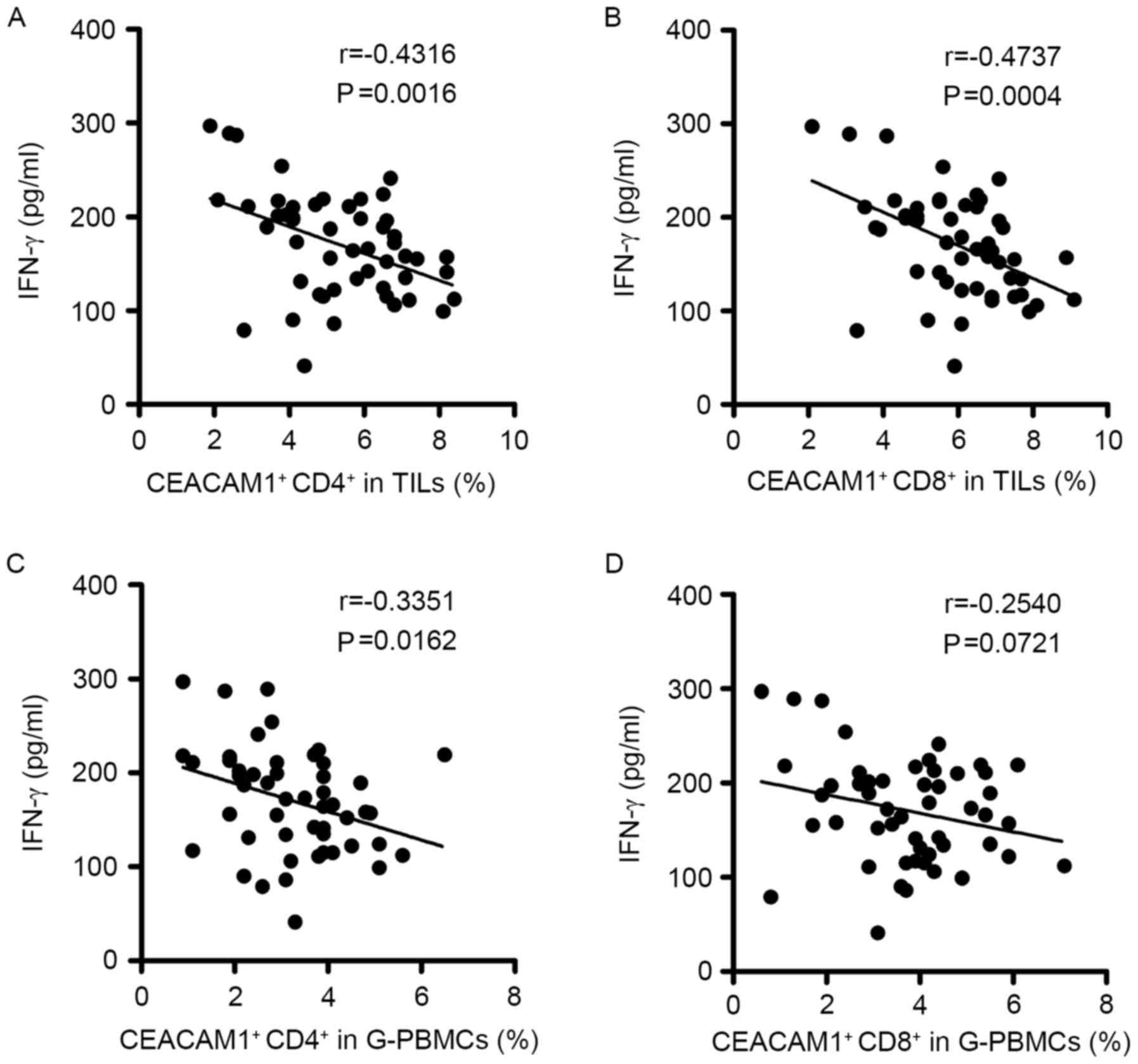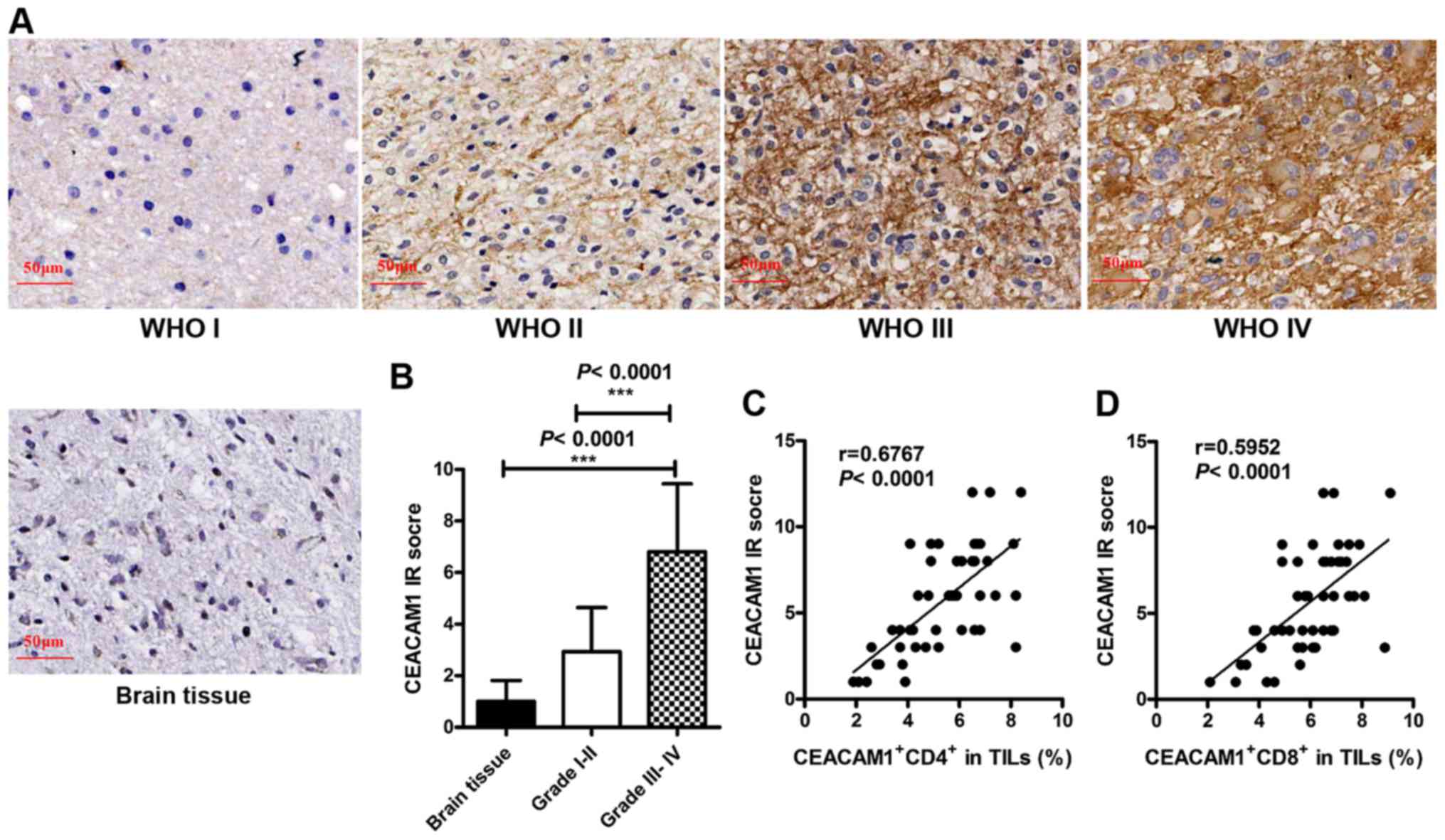|
1
|
Porter KR, Mccarthy BJ, Freels S, Kim Y
and Davis FG: Prevalence estimates for primary brain tumors in the
United States by age, gender, behavior, and histology.
Neuro-Oncology. 12:520–527. 2010. View Article : Google Scholar : PubMed/NCBI
|
|
2
|
Pan J, Zhao X, Lin C, Xu H, Yin Z, Liu T
and Zhang S: Immune responsive gene 1, a novel oncogene, increases
the growth and tumorigenicity of glioma. Oncol Rep. 32:1957–1966.
2014. View Article : Google Scholar : PubMed/NCBI
|
|
3
|
Stupp R, Mason WP, van den Bent MJ, Weller
M, Fisher B, Taphoorn MJ, Belanger K, Brandes AA, Marosi C, Bogdahn
U, et al: Radiotherapy plus concomitant and adjuvant temozolomide
for glioblastoma. N Engl J Med. 352:987–996. 2005. View Article : Google Scholar : PubMed/NCBI
|
|
4
|
Wang N, Feng Y, Wang Q, Liu S, Xiang L,
Sun M, Zhang X, Liu G, Qu X and Wei F: Neutrophils infiltration in
the tongue squamous cell carcinoma and its correlation with CEACAM1
expression on tumor cells. PLoS One. 9:e899912014. View Article : Google Scholar : PubMed/NCBI
|
|
5
|
Kiriyama S, Yokoyama S, Ueno M, Hayami S,
Ieda J, Yamamoto N, Yamaguchi S, Mitani Y, Nakamura Y, Tani M, et
al: CEACAM1 long cytoplasmic domain isoform is associated with
invasion and recurrence of hepatocellular carcinoma. Ann Surg
Oncol. 21 Suppl 4:S505–S514. 2014. View Article : Google Scholar : PubMed/NCBI
|
|
6
|
Dupuis ML, Fiori V, Soriani A, Ricci B,
Dominici S, Moricoli D, Ascione A, Santoni A, Magnani M and
Cianfriglia M: The human antibody fragment DIATHIS1 specific for
CEACAM1 enhances natural killer cell cytotoxicity against melanoma
cell lines in vitro. J Immunother. 38:357–370. 2015. View Article : Google Scholar : PubMed/NCBI
|
|
7
|
Markel G, Sapir Y, Mandel I, Hakim M,
Shaked R, Meilin E, McClanahan T, Loboda A, Hashmueli S and Ben
Moshe T: Inhibition of the novel immune checkpoint CEACAM1 to
enhance anti-tumor immunological activity. J Clin Oncol.
34:2016.
|
|
8
|
Markel G, Seidman R, Stern N, Cohen-Sinai
T, Izhaki O, Katz G, Besser M, Treves AJ, Blumberg RS, Loewenthal
R, et al: Inhibition of human tumor-infiltrating lymphocyte
effector functions by the homophilic carcinoembryonic cell adhesion
molecule 1 interactions. J Immunol. 177:6062–6071. 2006. View Article : Google Scholar : PubMed/NCBI
|
|
9
|
Markel G, Lieberman N, Katz G, Arnon TI,
Lotem M, Drize O, Blumberg RS, Bar-Haim E, Mader R, Eisenbach L and
Mandelboim O: CD66a interactions between human melanoma and NK
cells: A novel class I MHC-independent inhibitory mechanism of
cytotoxicity. J Immunol. 168:2803–2810. 2002. View Article : Google Scholar : PubMed/NCBI
|
|
10
|
Hosomi S, Chen Z, Baker K, Chen L, Huang
YH, Olszak T, Zeissig S, Wang JH, Mandelboim O, Beauchemin N, et
al: CEACAM1 on activated NK cells inhibits NKG2D-mediated cytolytic
function and signaling. Eur J Immunol. 43:2473–2483. 2013.
View Article : Google Scholar : PubMed/NCBI
|
|
11
|
Chen Z, Chen L, Baker K, Olszak T, Zeissig
S, Huang YH, Kuo TT, Mandelboim O, Beauchemin N, Lanier LL and
Blumberg RS: CEACAM1 dampens antitumor immunity by down-regulating
NKG2D ligand expression on tumor cells. J Exp Med. 208:2633–2640.
2011. View Article : Google Scholar : PubMed/NCBI
|
|
12
|
Ortenberg R, Sapir Y, Raz L, Hershkovitz
L, Ben Arav A, Sapoznik S, Barshack I, Avivi C, Berkun Y, Besser
MJ, et al: Novel immunotherapy for malignant melanoma with a
monoclonal antibody that blocks CEACAM1 homophilic interactions.
Mol Cancer Ther. 11:1300–1310. 2012. View Article : Google Scholar : PubMed/NCBI
|
|
13
|
Zhang L, Wang J, Wei F, Wang K, Sun Q,
Yang F, Jin H, Zheng Y, Zhao H, Wang L, et al: Profiling the
dynamic expression of checkpoint molecules on cytokine-induced
killer cells from non-small-cell lung cancer patients. Oncotarget.
7:43604–43615. 2016.PubMed/NCBI
|
|
14
|
Li Y and Shively JE: CEACAM1 regulates
Fas-mediated apoptosis in Jurkat T-cells via its interaction with
β-catenin. Exp Cell Res. 319:1061–1072. 2013. View Article : Google Scholar : PubMed/NCBI
|
|
15
|
Grayowen SD and Blumberg RS: CEACAM1:
Contact-dependent control of immunity. Nat Rev Immunol. 6:433–446.
2006. View
Article : Google Scholar : PubMed/NCBI
|
|
16
|
Ashkenazi S, Ortenberg R, Besser M,
Schachter J and Markel G: SOX9 indirectly regulates CEACAM1
expression and immune resistance in melanoma cells. Oncotarget.
7:30166–30177. 2016. View Article : Google Scholar : PubMed/NCBI
|
|
17
|
Zhou Z, Luther N, Ibrahim GM, Hawkins C,
Vibhakar R, Handler MH and Souweidane MM: B7-H3, a potential
therapeutic target, is expressed in diffuse intrinsic pontine
glioma. J Neurooncol. 111:257–264. 2013. View Article : Google Scholar : PubMed/NCBI
|
|
18
|
Lemke D, Pfenning PN, Sahm F, Klein AC,
Kempf T, Warnken U, Schnölzer M, Tudoran R, Weller M, Platten M and
Wick W: Costimulatory protein 4IgB7H3 drives the malignant
phenotype of glioblastoma by mediating immune escape and
invasiveness. Clin Cancer Res. 18:105–117. 2012. View Article : Google Scholar : PubMed/NCBI
|
|
19
|
Liu Z, Han H, He X, Li S, Wu C, Yu C and
Wang S: Expression of the galectin-9-Tim-3 pathway in glioma
tissues is associated with the clinical manifestations of glioma.
Oncol Lett. 11:1829–1834. 2016. View Article : Google Scholar : PubMed/NCBI
|
|
20
|
Wainwright DA, Chang AL, Dey M,
Balyasnikova IV, Kim CK, Tobias A, Cheng Y, Kim JW, Qiao J, Zhang
L, et al: Durable therapeutic efficacy utilizing combinatorial
blockade against IDO, CTLA-4 and PD-L1 in mice with brain tumors.
Clin Cancer Res. 20:5290–5301. 2014. View Article : Google Scholar : PubMed/NCBI
|
|
21
|
Louis DN, Ohgaki H, Wiestler OD, Cavenee
WK, Burger PC, Jouvet A, Scheithauer BW and Kleihues P: The 2007
WHO classification of tumours of the central nervous system. Acta
Neuropathol. 114:97–109. 2007. View Article : Google Scholar : PubMed/NCBI
|
|
22
|
Johnson MJ, Bland JM, Davidson PM, Newton
PJ, Oxberry SG, Abernethy AP and Currow DC: The relationship
between two performance scales: New York heart association
classification and karnofsky performance status scale. J Pain
Symptom Manage. 47:652–658. 2014. View Article : Google Scholar : PubMed/NCBI
|
|
23
|
Feng F, Kuai D, Wang H, Li T, Miao W, Liu
Y and Fan Y: Reduced expression of microRNA-497 is associated with
greater angiogenesis and poor prognosis in human gliomas. Hum
Pathol. 58:47–53. 2016. View Article : Google Scholar : PubMed/NCBI
|
|
24
|
Hong B, Li H, Lu Y, Zhang M, Zheng Y, Qian
J and Yi Q: USP18 is crucial for IFN-γ-mediated inhibition of B16
melanoma tumorigenesis and antitumor immunity. Mol Cancer.
13:1322014. View Article : Google Scholar : PubMed/NCBI
|
|
25
|
Platten M, Weller M and Wick W: Shaping
the glioma immune microenvironment through tryptophan metabolism.
CNS Oncol. 1:99–106. 2012. View
Article : Google Scholar : PubMed/NCBI
|
|
26
|
Sharma P and Allison JP: The future of
immune checkpoint therapy. Science. 348:56–61. 2015. View Article : Google Scholar : PubMed/NCBI
|
|
27
|
Kim ES, Kim JE, Patel MA, Mangraviti A,
Ruzevick J and Lim M: Immune checkpoint modulators: An emerging
antiglioma armamentarium. J Immunol Res. 2016:46836072016.
View Article : Google Scholar : PubMed/NCBI
|
|
28
|
Ahn BJ, Pollack IF and Okada H:
Immune-Checkpoint blockade and active immunotherapy for glioma.
Cancers. 5:1379–1412. 2013. View Article : Google Scholar : PubMed/NCBI
|
|
29
|
Peng W, Liu C, Xu C, Lou Y, Chen J, Yang
Y, Yagita H, Overwijk WW, Lizée G, Radvanyi L and Hwu P: PD-1
blockade enhances T-cell migration to tumors by elevating IFN-γ
inducible chemokines. Cancer Res. 72:5209–5218. 2012. View Article : Google Scholar : PubMed/NCBI
|
|
30
|
Han S, Feng S, Xu L, Shi W, Wang X, Wang
H, Yu C, Dong T, Xu M and Liang G: Tim-3 on peripheral
CD4+ and CD8+ T cells is involved in the
development of glioma. DNA Cell Biol. 33:245–250. 2014. View Article : Google Scholar : PubMed/NCBI
|
|
31
|
Huang YH, Zhu C, Kondo Y, Anderson AC,
Gandhi A, Russell A, Dougan SK, Petersen BS, Melum E, Pertel T, et
al: CEACAM1 regulates TIM-3-mediated tolerance and exhaustion.
Nature. 517:386–390. 2015. View Article : Google Scholar : PubMed/NCBI
|















